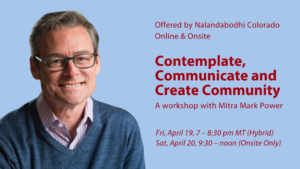But take that very illness as a path and by its power
Remove the obscurations blocking me,
And use it to encourage the qualities worthwhile;
When illness rears its head, sheer delight!— Gotsangpa
I have known my share of disquiet as I am bipolar. I have received a lot of professional help, and just as important, I have maintained a very consistent practice focused on the ways of working with mind that my teacher, Dzogchen Ponlop Rinpoche, has taught us: how to rest in the natural state. Of equal importance have been the songs of realization or dohas — songs of instruction and inspiration — that we sing in our Nyingma and Kagyu Buddhist tradition, especially those of Gyalwa Gotsangpa, a celebrated master of the Tibetan Drukpa lineage. His dohas span the breadth of disquiet, be it illness or otherwise.
So, how have I worked with disquiet, a mind that won’t settle down? To practice with an open and fresh mind, I re-read Ponlop Rinpoche’s shamatha or calm-abiding meditation instructions in his text called Knowing Oneself (included in the Nalandabodhi Hinayana series). By practicing the instructions, I am able to settle my mind. What I find most effective are the techniques of following and resting.
With following, you place your attention on the breath. Follow the exhalation for about a foot out in front of you, and then follow the inhalation. Notice how the breath moves in your body, where it goes, what it fills. You can do 3 sets of inhalations and exhalations, or 10 sets, then pause for a bit before returning to the practice of following the breath.
When you practice resting, place your attention on the breath going out. As the breath goes out, then comes back in, place your attention on it without any thought. Just rest and relax with the breath. For me, both techniques of following and resting became a natural way to settle my mind.
When it came to my “walking around meditation practice,” i.e., being away from the cushion, or what Ponlop Rinpoche calls “mixing your mind with the dharma,” settling was also very hard. But I learned to settle my mind by remembering the songs of realization, in particular those of Gyalwa Gotsangpa. By repeating them, they became like a mantra, or mind protection, and that quieted my mind, allowing me to see again the importance of letting go and relaxing.
For those of you who struggle with a mind of disquiet, be it transitory or otherwise, you could begin by resting in shamatha, the basis of all Buddhist practice. With time and practice, shamatha might become a helpful way for you, too, to naturally settle your mind.

Andrew Clark first met Dzogchen Ponlop Rinpoche in 1996 at Gampo Abbey and became a formal student in 1999. He was the co-head for study in Boulder from 1999 to 2005. In 2008, Andrew joined the US Karma Sangha board and was its chair from 2011 to 2018. He recently retired from the University of Colorado Boulder, where he taught mathematics and finance.






